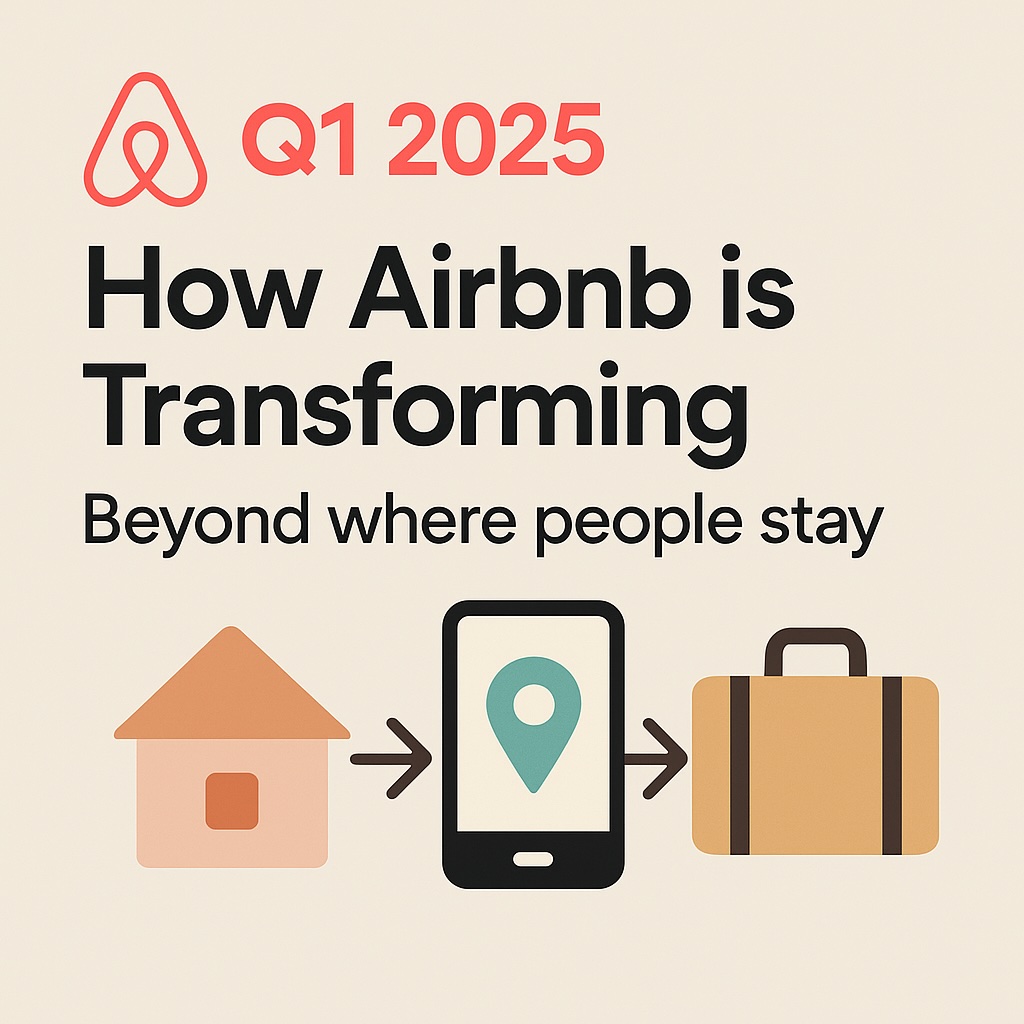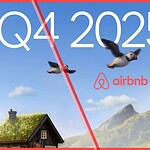🎬 1. Is Airbnb’s Growth Slowing Down? And in the U.S.?
Let’s take a step back.
Airbnb reported $2.3 billion in Q1 revenue, a 6% increase year-over-year. But this growth rate is impacted by calendar quirks-Easter and Leap Day both fell in Q1 2024, boosting last year’s numbers. If you strip out those effects and currency shifts, revenue growth would have been 11%.
“If you exclude the impact of FX and calendar factors, revenue would have grown 11%.” – Ellie Mertz, CFO
Key stats:
- 143.1 million nights and experiences booked (+8% YoY)
- Gross Booking Value: $24.5 billion (+7%, or +9% ex-FX)
- $807 million in share repurchases in Q12
Geography:
CEO Brian Chesky noted that five countries-the U.S., Australia, Canada, U.K., and France-account for nearly 70% of Airbnb’s business. But expansion markets like Spain, Italy, Germany, Mexico, Brazil, China, India, Korea, and Japan are now growing at more than double the rate of core markets. In Brazil, origin nights grew 27% and first-time bookers were up over 30%.
U.S. Market:
The U.S. business is predominantly domestic; inbound international travel is only 2–3% of U.S. bookings. While corridors like Canada-to-U.S. have softened, Canadians are still traveling-just to different destinations (e.g., Mexico, up 27% in March). Higher-income U.S. travelers are booking steadily, short-lead bookings are strong, but longer-lead bookings have softened.
What this means for managers:
- Airbnb is still growing, but the pace is slower.
- U.S. demand is stable, though uneven across regions and segments.
- Airbnb’s strategy: adapt, reallocate supply, and redirect demand.
🎬 2. Why Is Airbnb Bringing Us Back to the COVID Playbook?
If it feels like Airbnb keeps talking about resilience, it’s on purpose-and it’s not just talk.
CEO Brian Chesky and the leadership team explicitly connect Airbnb’s founding during the Great Recession, its rapid COVID-19 pivot, and today’s uncertainty. On the Q1 2025 call, Chesky said:
“We started Airbnb during the Great Recession of 2008… In 2020, when the pandemic hit, we provided a way for people to travel close to home. And as a result, our business quickly rebounded. And by the end of that year, we went public. Today, things feel uncertain once again. But just as we’ve shown in the past, as the world changes, Airbnb will continue to adapt.”
This message is for hosts and managers too: Airbnb weathered global shocks before-pivoting to local and longer-term stays, cutting costs, and refocusing on its core business. That “back to basics” approach helped Airbnb rebound faster than many competitors. Now, with new economic and geopolitical uncertainties, Airbnb is signaling it will use the same playbook:
- Lean into adaptability: offering every type of stay, at every price point, in every neighborhood
- Support hosts: providing tools and flexibility to help them earn income, even as travel patterns shift
- Focus on core strengths: reliability, affordability, and a global network that can flex with demand
🎬 3. What’s Coming on May 13 for the Summer 2025 Release?
Mark your calendar: May 13 is Airbnb’s next major product launch.
CEO Brian Chesky teased:
“We’ve been focused on long-term growth and getting ready for our next chapter, when we’ll expand beyond places to stay.”
While details are scarce, Airbnb has rebuilt its app from the ground up to support new verticals and faster innovation. The company is likely to:
- Integrate experiences and services more deeply into the booking flow
- Use AI to recommend offerings at just the right moment (after booking, before check-in, etc.)
- Reach all guests in a group, not just the booker
For managers, this means more guest interactions will happen inside the Airbnb app-not directly with you. The balance of power and guest engagement is shifting further toward Airbnb’s ecosystem.
🎬 3.5 Are Hotels Back? Airbnb’s Quiet but Strategic Return to Hotel Inventory
While most attention is on the May 13 release, hotels are quietly returning to Airbnb.
In Q1 2025, HotelTonight (an Airbnb subsidiary) launched a 10% Airbnb credit for hotel bookings in the U.S. and U.K., redeemable for future Airbnb stays or experiences1. This is the first financial link between Airbnb’s hotel offering and its core business-a clear move to turn hotel guests into future Airbnb users.
CEO Brian Chesky:
“Over the coming years, we’re going to be doing a lot more on Airbnb’s application to bring more great hotels onto Airbnb. We think almost all the hoteliers in the world would love to have Airbnb as a distribution channel.”
What’s the strategy?
- Fill network gaps when homes are booked out
- Capture more bookings from guests who default to hotels
- Become a distribution channel that hoteliers rely on
For managers:
Hotel inventory is still limited-but Airbnb is laying the foundation for hotel growth, especially in cities and during peak periods.
🎬 4. What Are the Risks to Airbnb’s Profitability?
Airbnb’s leadership is confident: the core business is so profitable, it can fund ambitious expansions without hurting the bottom line.
By the numbers:
- Net income: $154 million (7% margin)
- Adjusted EBITDA: $417 million (18% margin)
- Free Cash Flow: $1.8 billion this quarter
- Cash on hand: $11.5 billion
But expansion isn’t free. Airbnb is moving into unproven territory:
- Rebuilt the app from the ground up
- Teased new verticals (Experiences 2.0, host services, travel extras)
- Committed to spending $200–250 million in 2025 to launch and scale these new bets-including hiring, onboarding new supply, and global marketing
Airbnb has warned investors: margins in the second half of 2025 will be “flat to slightly down,” even if revenue keeps rising. For hosts and managers, this means:
- Airbnb is in a strong financial position-but some cash will go toward testing ideas
- Not every vertical will succeed
- There could be growing pains-especially if product changes affect the booking flow or guest behavior
🎬 5. Airbnb vs. Booking.com – Different Strategies, Same Market
Airbnb and Booking.com are both dominant platforms, but their strategies are diverging.
U.S. Market:
Airbnb’s U.S. business is built primarily on domestic demand (only 2–3% of U.S. bookings are international).
Booking.com’s U.S. value proposition has long been “We’ll bring you international travelers”-but that strategy is now showing signs of strain.
Connected Trip vs. Modular Journey:
Booking.com brands its approach as the “Connected Trip”-bundling flights, accommodation, cars, and attractions in one booking.
Airbnb’s CEO Brian Chesky said:
“Some companies want to plan every part of your trip for you. We don’t believe that works… A lot of companies have failed to design like a so-called connected trip.”
Only Booking.com uses the phrase “Connected Trip.” While Chesky didn’t name them, the target was clear.
Airbnb’s approach:
- Let the guest build their trip gradually
- Introduce services at the right moment, inside the Airbnb app
- Focus on relevance, timing, and personalization-not bundling everything upfront
For managers:
Watch both platforms closely. Each is integrating services, recommending experiences, and competing for your guest’s attention-and your revenue.
🎬 Final Takeaway: What This Means for Vacation Rental Managers
Airbnb’s Q1 2025 results confirm it: this is no longer just a platform for finding a place to stay. It’s a full ecosystem-growing, evolving, and rebuilding itself for the next decade.
Key points:
- Growth is steady, not spectacular. Airbnb’s expansion is more strategic than explosive.
- The app is now the center of gravity for guest interaction.
- Hotels are back, bringing new competition (and opportunity).
- Airbnb is investing for the long term, even if it means short-term margin pressure.
- The guest journey is being reshaped-before, during, and after the stay.
What comes next-starting May 13-could change how your guests discover you, engage with your property, and interact with Airbnb itself. Stay alert. Adapt quickly. Airbnb isn’t just building for the present- it’s designing the future of short-term rentals.
Thibault Masson is a leading expert in vacation rental revenue management and dynamic pricing strategies. As Head of Product Marketing at PriceLabs and founder of Rental Scale-Up, Thibault empowers hosts and property managers with actionable insights and data-driven solutions. With over a decade managing luxury rentals in Bali and St. Barths, he is a sought-after industry speaker and prolific content creator, making complex topics simple for global audiences.








